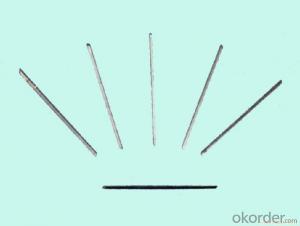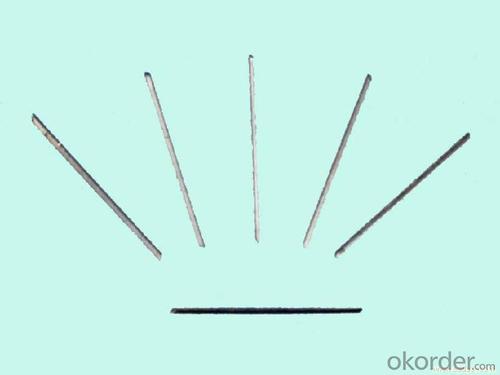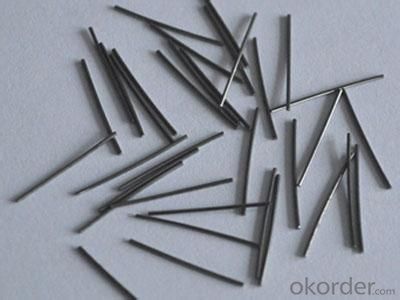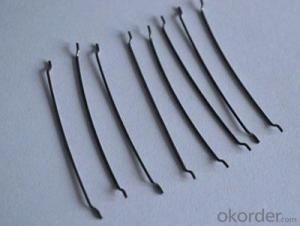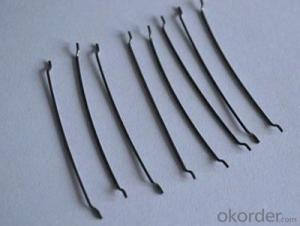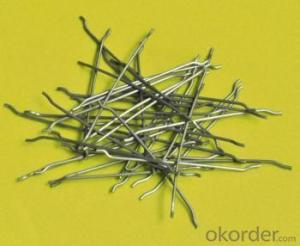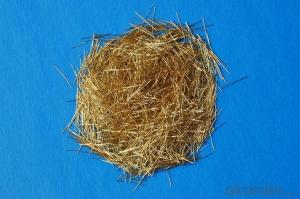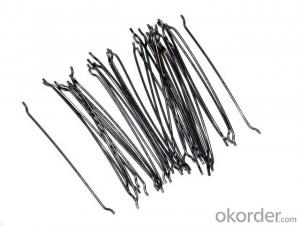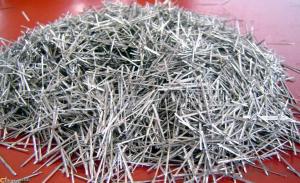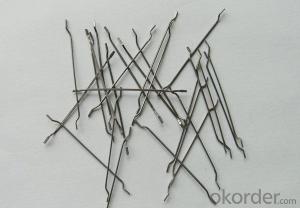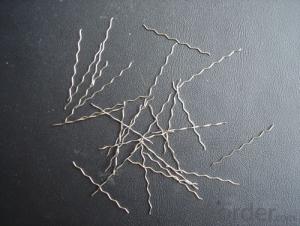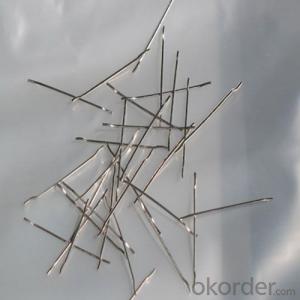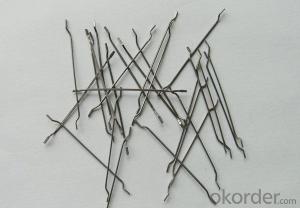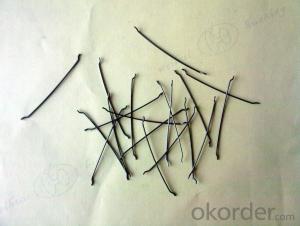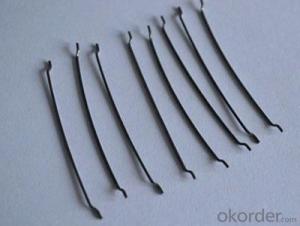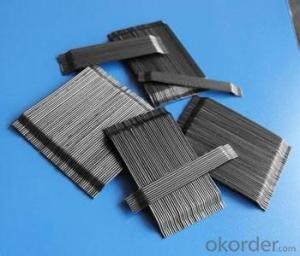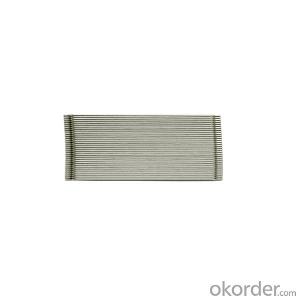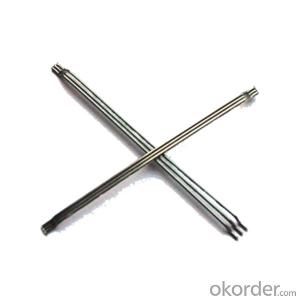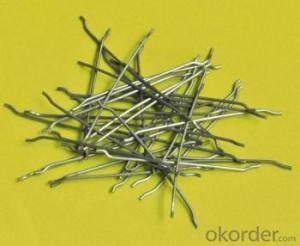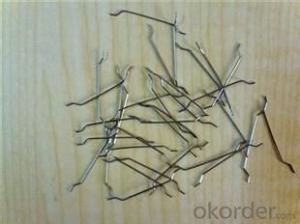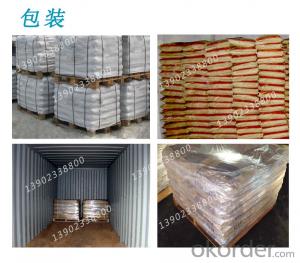Melt Extract Stainless Steel Fiber - Straight Type Steel Fiber from CNBM China
- Loading Port:
- Tianjin
- Payment Terms:
- TT OR LC
- Min Order Qty:
- 1000 kg
- Supply Capability:
- 30000 kg/month
OKorder Service Pledge
OKorder Financial Service
You Might Also Like
Quick Details
Place of Origin: Jiangsu, China (Mainland)
Model Number: HT-ST
Material: Steel
Specifications
ISO 9001 certificated
2.70% for Europe, Middle Asia, America market
3.Have the most number of steel fiber machine in china
1. Material: low carbon steel wire or stainless steel
2.Diameter: 0.4mm-1.0mm
3.Length: meet your requirements
4.tensile strength >1000Mpa
6.Feature: excellent tensile,high tenacity,against cracking,impact and fatigue
7.Uses: highway road surface,tunnel,building,airport road surface and so on .
Straight Steel Fiber
1.ISO 9001 certificated
2.70% for Europe, Middle Asia, America market
3.Have the most number of steel fiber machine in china
Picture
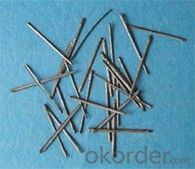
Steel fiber straight type
FAQ
certificated: ISO 9001
Technical advantages of Daye steel fiber:
A. Improve mechanical performance of concrete
B. Provide uniform distribution throughout concrete with excellent mixing
C. No balling or caking by adopt correct mixing method
D. Reduce concrete volume
E.Save construction time and cost
F.Reduce excavation volume
G.Available for jointless floor.
- Q: Can melt extract stainless steel fiber be used in airport runways or taxiways?
- Yes, melt extract stainless steel fiber can be used in airport runways or taxiways. Stainless steel fibers are known for their high strength and durability, making them suitable for heavy-duty applications like airport pavements. They can help improve the resistance to cracking and enhance the overall performance and lifespan of the runway or taxiway.
- Q: How does melt extract stainless steel fiber affect the freeze-thaw resistance of concrete?
- Melt extract stainless steel fibers can significantly enhance the freeze-thaw resistance of concrete. These fibers are added to the concrete mix during the mixing process, and they act as reinforcement within the concrete matrix. During freeze-thaw cycles, water within the concrete expands when it freezes, exerting pressure on the surrounding material. This can lead to cracking and deterioration of the concrete. However, the addition of melt extract stainless steel fibers helps to mitigate this issue. The fibers create a three-dimensional network within the concrete, effectively reinforcing it and improving its resistance to cracking. They enhance the tensile strength and ductility of the concrete, allowing it to better withstand the expansion and contraction caused by freeze-thaw cycles. Moreover, the stainless steel composition of these fibers provides excellent corrosion resistance. This is crucial in freeze-thaw conditions where the presence of water and deicing salts can accelerate corrosion processes. By preventing corrosion, the fibers maintain the structural integrity and durability of the concrete over time. Overall, the incorporation of melt extract stainless steel fibers in concrete improves its freeze-thaw resistance by reducing cracking, enhancing tensile strength, and providing corrosion resistance. This results in a more durable and long-lasting concrete structure that can withstand harsh environmental conditions.
- Q: How does melt extract stainless steel fiber contribute to the crack control of concrete?
- Melt extract stainless steel fiber enhances the crack control of concrete by acting as reinforcement within the material. The fibers are uniformly distributed throughout the concrete matrix, creating a three-dimensional network that helps to distribute loads and inhibit the propagation of cracks. This reinforcement improves the overall tensile strength and ductility of the concrete, reducing the formation and widening of cracks. Additionally, the stainless steel fibers can effectively bridge small cracks, preventing them from developing into larger, more significant cracks.
- Q: What are the advantages of using melt extract stainless steel fiber in concrete reinforcement?
- Using melt extract stainless steel fiber in concrete reinforcement offers several advantages. Firstly, stainless steel fibers enhance the mechanical properties of concrete, increasing its tensile strength, toughness, and durability. This leads to improved resistance against cracking, impact, and fatigue, thereby extending the lifespan of the concrete structure. Additionally, stainless steel fibers provide excellent corrosion resistance, protecting the concrete from deterioration caused by exposure to harsh environmental conditions, chemicals, or chloride ions. Furthermore, the addition of stainless steel fibers enhances the fire resistance of concrete, as they can withstand high temperatures without melting or losing their structural integrity. This makes it an ideal choice for applications that require fire-resistant structures like tunnels, industrial buildings, or firewalls. Lastly, stainless steel fibers offer improved workability and ease of construction. They can be easily mixed into the concrete mix, ensuring uniform distribution throughout the structure. This eliminates the need for additional reinforcement like rebar or mesh, simplifying the construction process and reducing labor and material costs. Overall, using melt extract stainless steel fiber in concrete reinforcement provides numerous advantages such as increased strength, corrosion resistance, fire resistance, and improved workability, making it a desirable choice for various construction applications.
- Q: What is the effect of melt extract stainless steel fiber on the plastic settlement of shotcrete?
- The impact of melt extract stainless steel fiber on the plastic settlement of shotcrete cannot be underestimated. The inclusion of these fibers in the shotcrete mixture not only enhances its overall performance but also mitigates the issue of plastic settlement. Shotcrete is widely utilized in construction due to its rapid and efficient application. Nevertheless, it is susceptible to plastic settlement, which occurs when the material sinks or settles before it solidifies. This settlement can lead to undesirable outcomes such as cracks, voids, and weakened strength in the shotcrete. To combat this problem, melt extract stainless steel fibers have been specifically developed. These fibers are incorporated into the shotcrete mix and uniformly disperse throughout the material during the application process. As the shotcrete settles, the stainless steel fibers act as a reinforcement, providing additional support and preventing excessive settlement. The introduction of stainless steel fibers significantly enhances the tensile strength of the shotcrete, thereby augmenting its resistance to cracking and deformation. These fibers establish a three-dimensional network within the material, bolstering its overall structural integrity. Consequently, the plastic settlement of shotcrete is substantially reduced, ensuring that it maintains its form and strength during the setting process. Moreover, melt extract stainless steel fibers also contribute to the durability and longevity of shotcrete. They serve as a preventive measure against the formation of shrinkage cracks and offer added protection against external factors such as temperature fluctuations, moisture, and chemical exposure. To sum up, the incorporation of melt extract stainless steel fibers into shotcrete yields a positive impact on its plastic settlement. These fibers fortify the material, diminish settlement, and enhance its overall performance, durability, and strength.
- Q: Can melt extract stainless steel fiber be used in architectural concrete applications?
- Yes, melt extract stainless steel fiber can be used in architectural concrete applications. Stainless steel fibers are often added to concrete mixtures to increase its strength, durability, and resistance to cracking. The melt extract stainless steel fibers are particularly effective in architectural concrete applications due to their high tensile strength and corrosion resistance. These fibers can help to reinforce the concrete, improve its structural integrity, and provide additional protection against potential damage from environmental factors or heavy loads. Moreover, the use of stainless steel fibers in architectural concrete can also enhance the aesthetic appearance of the finished product, as they can be easily polished to create a smooth and shiny surface. Overall, melt extract stainless steel fibers are a suitable choice for architectural concrete applications, offering both functional and aesthetic benefits.
- Q: Does melt extract stainless steel fiber enhance the flexural toughness of concrete beams?
- Yes, melt extract stainless steel fiber does enhance the flexural toughness of concrete beams. The addition of these fibers improves the resistance of the concrete to cracking, increasing its ability to withstand bending and flexural loads.
- Q: Can melt extract stainless steel fiber be used in thin concrete overlays?
- Yes, melt extract stainless steel fiber can be used in thin concrete overlays. These fibers are typically added to concrete mixes to enhance their mechanical properties and improve their durability. In thin concrete overlays, where the thickness of the concrete layer is less than 2 inches, the use of stainless steel fibers can help to reduce cracking and increase resistance to shrinkage and impact. The fibers provide additional reinforcement and improve the overall performance of the concrete overlay. However, it is important to ensure that the correct dosage of fibers is used and that they are evenly distributed throughout the mix to achieve optimal results. Additionally, proper surface preparation and application techniques are crucial to ensure the successful use of melt extract stainless steel fiber in thin concrete overlays.
- Q: How does melt extract stainless steel fiber affect the rheology of self-compacting shotcrete?
- The rheology of self-compacting shotcrete can be significantly influenced by the inclusion of melt extract stainless steel fibers. To begin with, the incorporation of stainless steel fibers can enhance the viscosity and fluidity of the shotcrete mixture. These fibers act as reinforcements and aid in maintaining the stability and flow of the mixture, preventing segregation and settlement during application. This is especially crucial in self-compacting shotcrete, where achieving a high level of workability is necessary for proper consolidation and filling of desired areas. Furthermore, the stainless steel fibers also improve the cohesion and cohesiveness of the shotcrete mixture. Serving as bonding agents, these fibers enhance the interactions between particles, thereby increasing the strength and durability of the shotcrete. As a result, the material becomes more cohesive and stable, reducing the likelihood of cracking and shrinkage. Moreover, the presence of stainless steel fibers can also influence the setting time of the shotcrete. These fibers can expedite the hydration process and promote early strength development. This is advantageous in self-compacting shotcrete applications that require rapid setting and early strength to facilitate faster construction progress. In addition, the melt extract stainless steel fibers contribute to the overall ductility and toughness of the shotcrete. They offer additional resistance against crack propagation and enhance the structural integrity of the material. This is particularly important in self-compacting shotcrete as it improves performance under dynamic loading conditions and enhances the material's ability to withstand external forces. Overall, the inclusion of melt extract stainless steel fibers positively impacts the rheology of self-compacting shotcrete by enhancing viscosity, cohesion, setting time, and overall durability. Their addition improves the workability and performance of the shotcrete, making it highly suitable for various construction applications.
- Q: Does melt extract stainless steel fiber improve the resistance to acid attack in concrete?
- Yes, melt extract stainless steel fiber does improve the resistance to acid attack in concrete. The stainless steel fibers act as reinforcement, enhancing the concrete's durability and preventing acid penetration, thereby improving its resistance to acid attack.
Send your message to us
Melt Extract Stainless Steel Fiber - Straight Type Steel Fiber from CNBM China
- Loading Port:
- Tianjin
- Payment Terms:
- TT OR LC
- Min Order Qty:
- 1000 kg
- Supply Capability:
- 30000 kg/month
OKorder Service Pledge
OKorder Financial Service
Similar products
Hot products
Hot Searches
Related keywords
